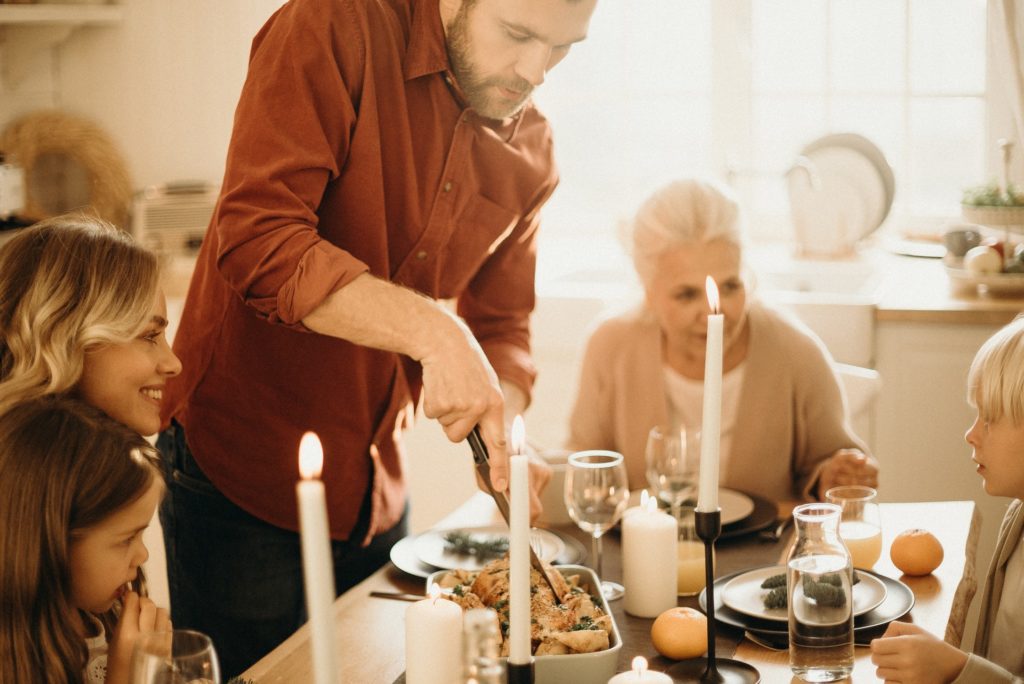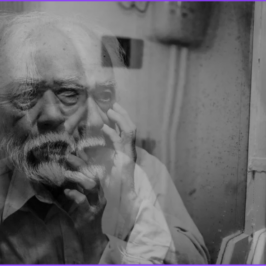
By: Brian Warner
Somewhere in the middle of scouring Amazon for last minute gifts, we’re reminded that the true meaning of this time of year is supposed to be family. From Norman Rockwell’s Thanksgiving to every Hallmark movie released, we’re told time and again how any holiday worth its weight by UPS shipping standards is all about sharing it with family. And while those are both bastions of reality, the real-world experiences for many people make this time of year feel more stressful than familial. Maybe the generational divide is getting wider or political polarization is getting stronger but, for some people, the holiday season is most associated with carefully navigating tripwires in complex family dynamics. In some ways our families know us better than anyone else, and while this can be a source of joy, it can also open us up to feeling guarded because of our own vulnerabilities. Practicing empathy in the face of these vulnerable feelings, though, can be a driving force in turning these visits home around. Past the stressors on our relationships, like politics, money, significant others, etc., feelings like fear, confusion, and loneliness are something we all share and can give insight into someone else’s best intentions. That doesn’t mean agreeing with or approving of things that go against our morals or boundaries, but moving through the holiday season with better skill to connect with others’ emotions, rather than disconnect from our own.
When we think of empathy we usually think of Emotional Empathy, or the act of taking on the feelings of someone else. Say your child is in the middle of a messy breakup; the heartbreak you feel with them is Emotional Empathy. Whereas, if you hear about the latest argument they had with their partner and thought how disappointed they must be with how things turned out, you’d be feeling Cognitive Empathy. It’s the ability to recognize someone’s emotions and understand why they’d feel that way. The final type of empathy is Empathic Concern/Compassion, or wanting to take action and ease someone’s feelings (for example, helping to take your child’s mind off of things or [jokingly] offering to call a local hitman). Empathy is complicated and, when we’re trying to avoid an argument at the dinner table, we may employ all three types, a combination of two, just one, or, for a certain person, not be willing to use any.
But why is this? It’s commonly thought that, even as young as infancy, a psychological glitch left over from our caveman days makes us susceptible to most identifying with people we see as “like us,” encouraging empathy-killing behaviors like tribalism, bullying, and racial bias. Surely that’d make our family members the people we get along with best, and yet…almost anyone can confirm that that’s not always true. It’s important when considering this, though, to remember that modern families look very different next to families from just a few decades ago, much less cave-families; according to historian Stephanie Coontz and psychologist Joshua Coleman from the Council on Contemporary Families,
Never before have family relationships been seen as so interwoven with the search for personal growth, the pursuit of happiness, and the need to confront and overcome psychological obstacles. For most of history, family relationships were based on mutual obligations rather than on mutual understanding…[and] the idea that a relative could be faulted for failing to honor/acknowledge one’s ‘identity’ would have been incomprehensible.
What does this mean, though? Should we give up on the idea of family bonds past child-rearing age? Embrace the frustration of political arguments? Or find a way through?
Just hours after birth, all of us start to show signs of mirror neurons, brain cells that fire off whenever we perform an action or see matching actions from someone else (like smiling back at someone). They form the basis of empathy, but just because they come naturally doesn’t mean they come easily. Like all neural pathways, empathy is a skill that can either develop or atrophy over time. Because of this, practicing empathy in spaces that aren’t as complicated as a stressful family holiday sets us up for whatever success we hope to achieve in more high-pressure situations, whether that’s creating a deeper connection with a family member or just not losing our cool in the car ride from the airport. One of the best ways this can be practiced? With ourselves. Self-compassion increases our capacity to show care to others, as well as recognize someone else’s feelings through Cognitive Empathy. Directing empathy inward also helps us break through emotional barriers from our trauma and shame, better equipping us to practice Emotional Empathy. Even small, everyday ways to practice, like verbal affirmations (“I tried my best and I’m proud of that”) and acts of service (checking in on a friend going through a hard time), reinforce these neural pathways to make us faster at responding in kinder, more empathic ways.
Because of this, the way we enter conversations is extremely important in setting the tone for each decision after. Looking to (at best) change minds or (at worst) shame someone for their politics, religion, or morals is always a competitive game, making someone into an opponent rather than a teammate; if we go into a conversation looking to “win,” the other person would have to “lose.” Not exactly the building blocks toward unwavering empathy. Unsurprisingly, disagreeing with someone takes up a lot of mental energy. Not only does it exhaust us, but, as the brain thinks it’s being threatened, it shuts down executive functions that help us with advanced thought processes (like self-awareness, emotion regulation, trust-building, and…conveying empathy) right when we need them the most! Instead, looking to discuss, rather than debate, keeps us engaged with the moment and with the relative we’re seated next to. As much as we may care about the facts and statistics we have stored away just for these particular moments, they unfortunately don’t do much. Instead, I-statements (like “I still feel scared about the pandemic because I don’t want to end up in the hospital” instead of “Our hospitals are overwhelmed because people won’t just get vaccinated already!”) ground the conversation at a level that’s emotionally accessible for all involved. When everyone talks this way, I-statements reduce feelings of hostility and drive people to connect on a deeper, more empathic level. Talking about how we formed our opinions, rather than why our opinions are right, similarly engages the parts of the brain that normally get shut down during conflict by centering the conversation on real-world emotion and human connection.
It’s important to remember that words have power, either to tear someone down or build them up, and this extends to empathy as well. While it can sometimes feel tempting to shut down, storm away, or sulk someone into guilt, there’s a good chance it’ll only make each side double down. Encouraging someone when they are empathetic, or even when they’re not, with statements like, “You’re a really good listener,” or “Thanks, I really needed to get that off my chest,” tells them that these are valued traits by the people around them and are more likely to create more empathy. Empathy researcher Dr. Jamil Zaki, Ph.D. describes this phenomenon by saying, “By calling kindness out, we’re more likely to make it magnetic through that social force.”
Lately, though, online culture has begun categorizing people into one of two camps: empaths and narcissists. It’s important to remember that neither of these are all-or-nothing traits, though. Empathy can be both a wonderful way people find each other through their personal differences and have healthy limits. When we find ourselves in the middle of complex family dynamics, like being seated at the dinner table next to a relative who has violated boundaries or even been physically, mentally, or emotionally harmful, there may only be emotional wellbeing gained by choosing not to empathize. This is not a failing, but self-compassion.
This can definitely feel like the tempting choice whenever conflict arises. Hearing people you care about prop up heinous beliefs or outright falsehoods is exhausting. Yet, when free of tribalism, tribes can be pretty amazing. A team of cavemen can bring down a lion, but the person who lives alone likely doesn’t live long. At the heart of this is empathy and the trust in others that empathy often requires. Actively practicing it with the people closest to us means practicing it where we are most vulnerable, and therefore the most open to having our emotional needs met. Empathy within and without is the building block toward a healthy relationship where we can be more forgiving, both of others and of ourselves, and toward a healthy, happy holiday season.
DISCLAIMER
The information, including but not limited to, text, graphics, images and other material contained on this website are for informational purposes only. No material on this site is intended to be a substitute for professional medical advice, diagnosis, or treatment. Always seek the advice of your physician or other qualified healthcare provider with any questions you may have regarding a medical condition or treatment and before undertaking a new health care regimen, and never disregard professional medical advice or delay in seeking it because of something you have read on this website.






